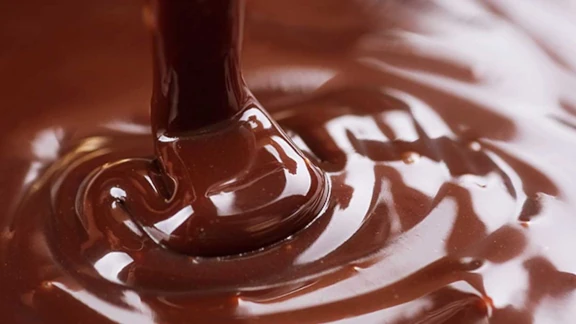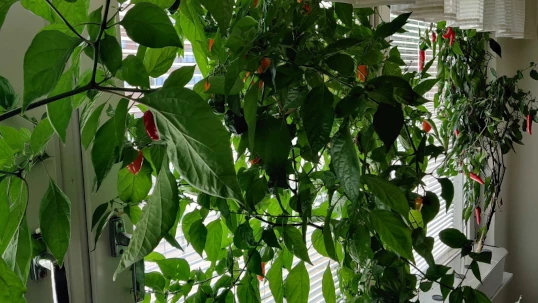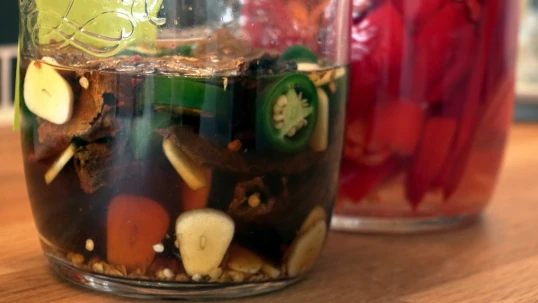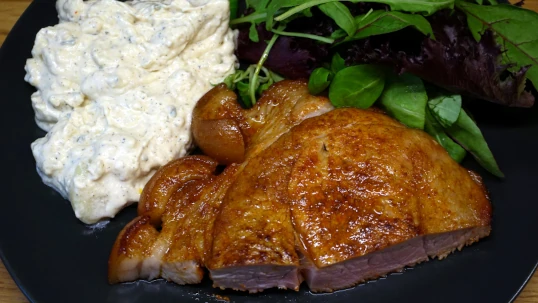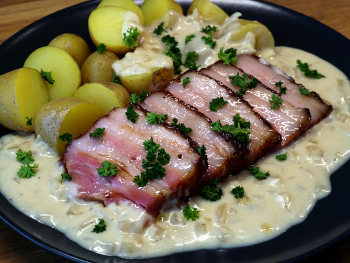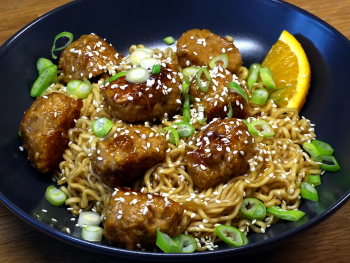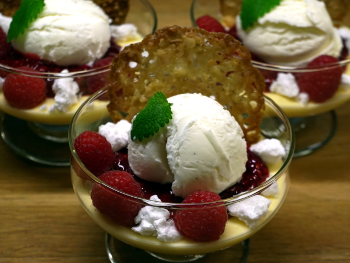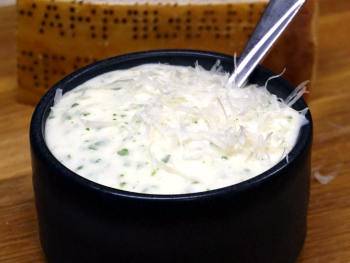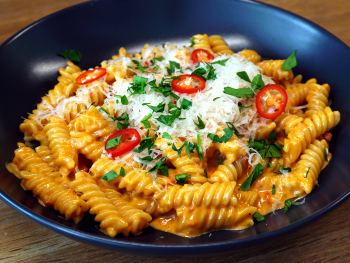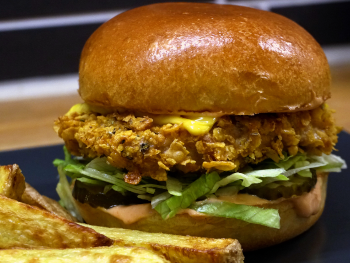Hydroponic farming means that you do not use soil. Instead, water with added nutrients is used.
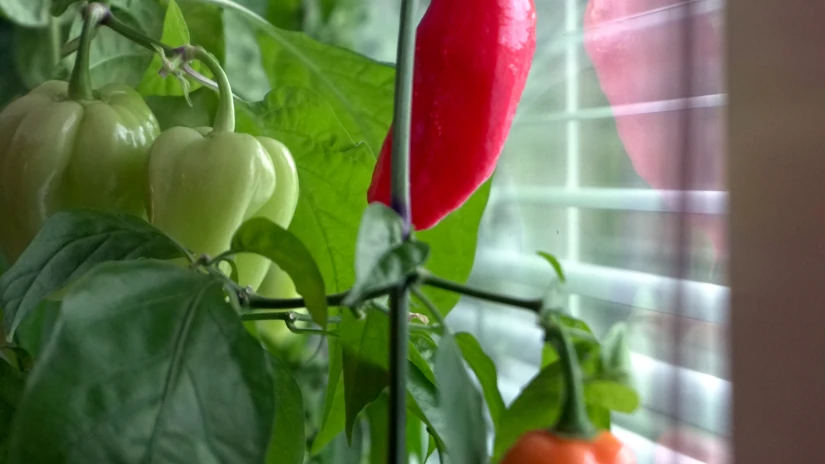
In a hydroponic system, the plant is placed in leca balls, rockwool, plugs or coconut fiber in a way that gives its roots access to water and nutrients. An exact amount of nutrients is added at each growth phase and the air in the system gives the plant constant access to oxygen. In addition to this, only the appropriate amount of light is needed for the plants to grow quickly.
There are a number of different types of systems in hydroponic farming, such as passive/self-irrigation, deep water culture, aeroponics, drip systems and ebb/flow. So far I have only tried a passive system which was very easy to use and did not require any pump or other type of electronics. The result was very good with strong growth in a short time.
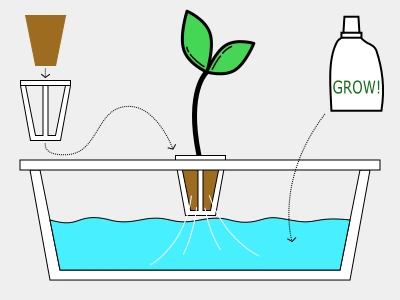 Passive hydroponic system
Passive hydroponic system
The passive system I have used so far is called "Harvy" and there are ready-made starter packs to buy in several different Swedish stores. I found it very easy to use and with a large water tank (9 liters) it takes quite a long time between refilling water and nutrition. However, I discovered some things I would like to change - more on that below.
A passive system does not use a pump to circulate the water, but uses capillary force and gravity. The advantages are that you avoid mechanical parts and that they are thus not noisy. Disadvantages are that they generally do not provide as fast growth and that the roots go in a circle in the pot.
Personally, I like this system as I have a built-in fear that a pump, sooner or later, will leak and cause water damage in the apartment. I also think there is a risk that the pump may become clogged after a period of use and require more maintenance. The ready-made systems that are available for purchase have certainly solved these problems, but I like the simplicity of a passive system and will continue to use one in 2022.
Chili farming 2021
The year started with me not even knowing what hydroponic farming was, but when my brother had a system over that he could not use due to lack of space, I had to borrow it. The system is called "Harvy" and can be found in many Swedish stores. The system consists of a plastic box that resembles the size of a normal balcony box with a lid, plastic baskets in which you put your cultivation plugs and special nutrients adapted for hydroponic farming.
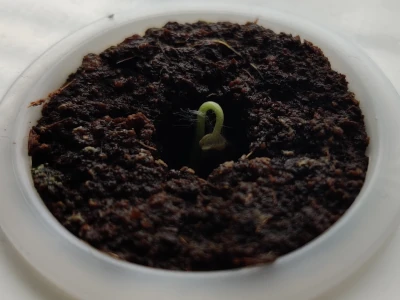 First sign of life
First sign of life
I was quite late in starting the cultivation, but it still went well and I saw results very quickly.
My idea was to grow some different kinds of chili such as habanero (orange and red), piri piri and naga jolokia (ghost pepper). This went very well and it took almost no time at all before all the plants began to grow. Pretty soon, however, I realized a limitation in the existing system I used and that was that the pre-drilled holes for the plastic baskets were quite close together if you were to grow chili. The plants become quite large and they then begin to intrude on each other's intended area. Had I used the same system for chili next year, I would probably have chosen to use only 3 of the 6 holes and plugged in the ones that were not used.
After a month it was clear that the plants would fight each other over access to the same area, but by then it was a bit too late so I just let it continue and chose to observe how it developed.
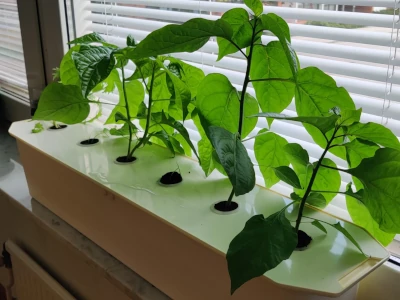 One month later
One month later
I also managed to place 2 seeds in the same plug and both started to grow quickly. This is not something I can recommend because it made the two plants intrude on each other's area even more and all in all, there was a bit of chaos in the cultivation. But despite this, it grew incredibly fast and some time later the first flowers began to appear. A short time later, I saw the first fruits and then it was time to harvest. All in all, it took about 3 months from seed to fruit.
The cultivation ended up in my kitchen window and had access to direct sun for most of the day. It was quite a long time between refilling water and nutrition so I never felt that there was any pressure to check the water level all the time. During the hottest summer months, of course, there were more frequent refills of fluid, but still nothing that required constant monitoring, but everything went pretty well without any major interference on my part.
What I learned from chili farming 2021
Overall, everything worked very well and did not require much work. When it all started, all you had to do was wait, refill it sometimes and then harvest delicious fresh chili. However, there were some things I want to change for the cultivation in 2022.
1. First of all, I will start cultivation earlier. I plan to start the whole process in early February.
2. The second thing I will change is that I choose to make some of my own pots according to similar passive hydroponic design, but only have one plant in each pot. I do this mostly to be able to move individual plants if they need more space or adjust the amount of light they require. It also gives me the opportunity to add nutrients of different types individually for each plant. Even though my current system works well, the pre-drilled causes a few limitations.
3. The third thing I will change is that I will get a different type of nutrition. There are nutrients that are specially developed for the growth phase and another that is intended to be used when the plant is in bloom. I have also read that specifically chilis thrives better in water that has a lower pH, which I will monitor and possibly adjust if necessary.
4. The fourth and final thing I will do differently is to add oxygen with an air pump (the kind used for aquariums) connected to oxygen stones in each pot. Oxygenation is important and I think that if I add an air pump that bubbles a little on the timer during the day can help with this. Admittedly, this means that I will have an electric gadget that is making noises and should there be too much noise, I will possibly opt out of this - it remains to be seen.
However, my existing system will not end up in the storage room - it will stand in the kitchen window and provide me with fresh basil, coriander, parsley and chives. It will be fun to see how everything develops in 2022! My idea is that I will create a new article on this page once I get started and the first seeds are planted.
